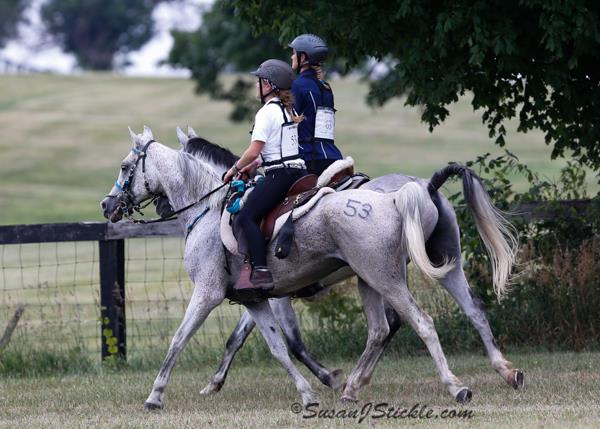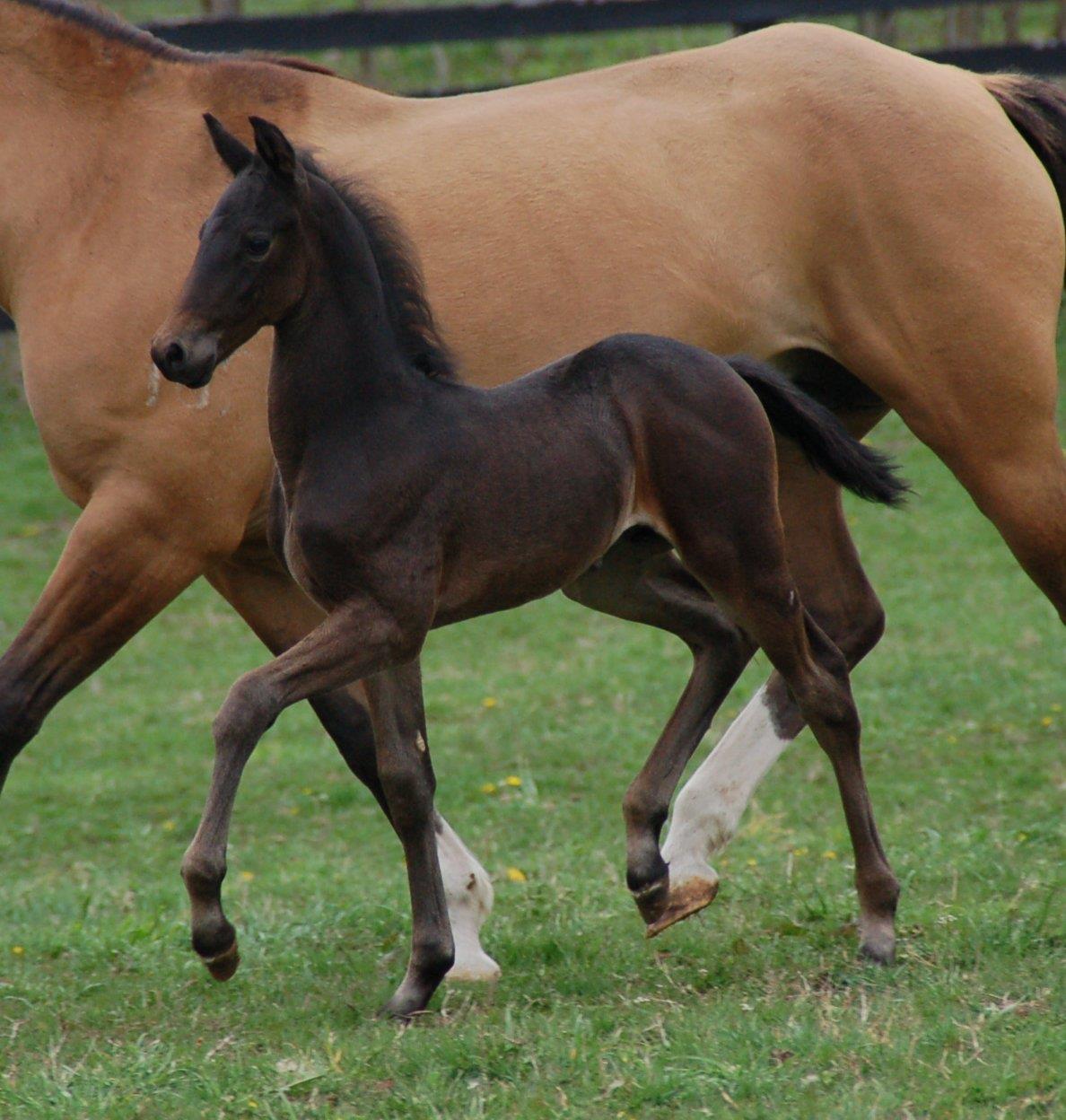This article originally appeared in EQUUS magazine, a media partner of US Equestrian.
Any horse will cough occasionally, particularly if he catches a noseful of dusty air or gets a bit of debris in his airway while he’s eating or drinking. That’s just a normal sign of a healthy airway keeping itself clean.
Sometimes, however, coughing is an early sign of illness or that your horse is developing an inflammatory condition, such as heaves, that will respond better when treated promptly. And in some circumstances—such as just after coming out of a trailer after a long ride—even a single cough or two may signal a life-threatening infection that requires immediate veterinary care.
Causes of Coughs
A number of illnesses and conditions can cause horses to cough. Here are a few of the more common ones:
- aspiration pneumonia—type of pneumonia that develops when foreign material is drawn into the lungs.
- inflammatory airway disease (IAD)—a little-understood condition commonly found in young racehorses and performance horses who periodically perform poorly, with or without coughing. Excess mucus and inflammatory cells are usually found during endoscopic examinations of such horses; also called “small airway disease” (SAD).
- influenza—very contagious, acute viral infection involving the respiratory tract. Marked by inflammation of the nasal mucosa, the pharynx, the conjunctiva, the lungs and sometimes the heart muscle, equine influenza is often associated with high fever, lack of appetite and the development of limb edema (stocking up).
- pleuropneumonia—bacterial infection of the lungs as well as the pleural lining between the lungs and the chest wall.
- pneumonia—inflammation of the lungs, especially the tissues as contrasted to the air passages (bronchitis).
- recurrent airway obstruction (RAO, “heaves”)—respiratory disease, usually of mature horses, induced by exposure to dusts typically found in stables. The disease is recurrent, depending on environmental exposure.
- rhinopneumonitis—highly contagious disease caused by herpesviruses (EHV-1, EHV-4); characterized by fever, mild respiratory infection and, in mares, abortion. In rare cases, some strains of these herpesviruses also cause potentially fatal neurological complications.
- strangles (distemper)—highly contagious infection of the lymph nodes, usually of the head, caused by Streptococcus equi bacteria. The abscesses may become so large as to obstruct the airway (hence the term “strangles”) and may break internally, draining a thick, yellow pus through the nose, or externally, draining through a spontaneous or surgical opening in the skin.
Knowing when to call the veterinarian for a coughing horse requires good judgment, but some indicators clearly signal the need to act. Call for help sooner rather than later if you notice the following in your horse:
Coughs That Persist Throughout a Ride

It’s not unusual for a horse to cough once or twice as he begins exercising. “There might be a small amount of debris and/or mucus in the upper airway [the sinus or nasal area], and the horse just needs to clear that out at the start of work,” says Virginia Buechner-Maxwell, DVM, DACVIM, of Virginia–Maryland Regional College of Veterinary Medicine in Blacksburg, Virginia.
However, coughing that continues throughout a ride may indicate the presence of a respiratory infection or other more serious problems. “These coughs are cause for concern, especially if they are performance-limiting,” says Amy Johnson, DVM, DACVIM, of the University of Pennsylvania School of Veterinary Medicine. “If the horse is having trouble breathing or seems a little short of air, or is acting less energetic than usual, halt the ride and try to find out why he is coughing.”
The problem could be a physical abnormality. “Occasionally we see horses with upper airway problems, as when the palate is displaced when exercising,” says Johnson. “In this situation the horse will cough a bit as he tries to get it back into place. This would usually occur during work and be more of a dry cough.” Coughing throughout exercise could also be a sign of inflammation in the airways stemming from any number of potential sources.
Even the occasional exercise-induced cough might be worth investigating. “This sort of cough is likely not a sign of serious disease, but chronic coughing is never normal,” says Buechner-Maxwell. “The first step to eliminating this cough is to examine the environment to determine if there is a source of debris or dust that could be inducing this response. If the cough persists, even if it is minor, have your veterinarian evaluate your horse, in case this is the first sign of allergies or some other problem—and reduce the risk of something minor becoming serious before it is detected and treated.”
Coughs That Produce Mucus
A “wet” or “productive” cough expels mucus. “Coughs of this nature usually originate in the trachea and bronchial tree and indicate that these airways are inflamed,” Buechner-Maxwell says. “However, airway inflammation occurs with a number of different conditions, including viral and bacterial infections as well as equine heaves.”
The color and thickness of the mucus produced offers clues to the nature of the problem. A horse with allergies will produce thin, clear or light-colored mucus, whereas a horse with a bacterial infection will produce nasal discharge that is thicker and yellow/white in color. Viral infections and other ailments fall somewhere between those extremes.
One quick way to distinguish an infectious from a noninfectious source of cough is to take the horse’s temperature. “Heaves would typically not cause a fever,” Johnson says. “One hint that it might be a viral infection is the fact that fevers are often initially higher. The discharge when the horse coughs tends to be more watery, compared to thicker discharge from a bacterial infection.”
If you suspect your horse has an infection, you’ll want to call the veterinarian and take action to protect the rest of the herd. “If you have reason to think it might be an infection—even if it’s just one horse in the group coughing--you should isolate that horse,” says Buechner-Maxwell. “If there’s a nasal discharge, even if it’s clear, or some swollen lymph nodes when you feel around on the neck, or a mild fever, you should move that horse away from the others.” A coughing horse with a respiratory illness can easily spread it to other herdmates. After moving the horse, be sure to wash up and maybe even change your clothes before handling other horses.
Coughs That Occur After Transport

A cough that develops a few hours after a horse has stepped off of a trailer is worth investigating promptly. One possibility, if the horse has been at a show or other event where he would have been exposed to others, is that he contracted a viral respiratory disease, such as equine influenza or rhinopneumonitis. “You often see multiple horses in a barn being affected, if it’s viral, or the horse has recently traveled and come home from somewhere, where he might have picked up a viral respiratory infection,” says Johnson.
Shipping fever, a serious and potentially deadly form of bacterial pneumonia, is another possibility. The risk for this infection rises if a horse spends hours riding in a trailer tied so that he cannot drop his head to clear his airways. “Shipping fever can be a combination of aspiration—breathing in particles of hay, for instance, while in a trailer—and not being able to get the head down to cough and clear out all of the foreign bodies and bacteria that have been inhaled, along with the stress of shipping,” says Johnson. “This can all contribute to shipping fever.”
Whatever the cause, you’ll want to call the veterinarian as soon as possible. If it’s a contagious disease, you will need to take measures quickly to prevent the disease from spreading throughout the herd, and if it’s shipping fever, your horse’s odds of survival are best if treatment is started within 48 hours.
Coughs Arising for No Obvious Reason
When a horse starts to cough as he just stands around in a non-dusty environment, you’ll want to investigate, especially if this new behavior appears suddenly. “If a horse in your herd has never coughed before and now has a cough, he should be examined by your veterinarian. There are some problems that might be unique to that one animal that could be causing the unexpected cough,” Buechner-Maxwell says. “Horses can develop things like guttural pouch mycosis, which would be a problem with just that horse, and wouldn’t go through the herd.”
Other unusual issues that can cause coughing include tumors that press against the airways or injuries, such as from a kick to the ribs, that cause inflammation in the lung.
“If a horse has developed a high dry, infrequent cough, and this is the first time you’ve heard it, you might watch it closely for a day or two—and if it persists you need to have your vet come take a look. It may be a foreign body in the airway, such as a piece of hay or straw,” says Buechner-Maxwell. “One of my colleagues was asked to examine a horse with a persistent cough. When he looked into the airway with an endoscope, he found a small piece of a rosebush stem. He was able to remove it, and the cough resolved.”
Sometimes, a cough can indicate a problem with an organ other than the lungs. “For example, cough is one of the clinical signs demonstrated by animals and people with heart disease, although severe heart disease is not common in horses,” Buechner-Maxwell says. “If a horse’s cough is associated with exercise intolerance, limb edema and an obvious ‘pulse’ wave that is visible the length of the jugular vein, get your veterinarian involved before the disease progresses further.”
When Youngsters Cough
Two distinct issues can cause coughing in horses younger than two years old:
- Ascarids, an equine roundworm (Parascaris equorum), emerge in the gut after a foal ingests the eggs, then migrate to the lungs. “Its presence in the airway eventually causes enough irritation that it provokes the foal to cough the parasite up to the top of the trachea, where the worm is swallowed back into the gut,” says Buechner-Maxwell. “There the parasite reaches maturity and begins to shed eggs that are passed out in the foal’s feces.” These parasites can create a lot of inflammation in the airways of the lungs, so coughing in a young horse is always worth investigating. “Older horses develop resistance to roundworms so even if they consume the eggs, the roundworms are usually not a cause of cough in horses 2 years and older,” says Buechner-Maxwell. “These eggs can survive a long time on pasture, sometimes for years, and become activated when consumed by a grazing horse.”
- Rhodococcus equi pneumonia can cause serious lung infections in foals younger than four months old. The bacterium resides in the soil, and foals acquire the disease by inhaling pathogen-laden dust particles. Mucus captures the bacteria in the respiratory tract, and as the foal coughs it up to the trachea and swallows it, the pathogens pass through his digestive tract and pass out into the soil again with his manure. Once R. equi is established in the soil on a farm, it will remain a threat to future generations of foals.
“If you have foals or young horses coughing, you need to figure out why,” Buechner-Maxwell says. “Monitoring temperatures is a good idea, and get your veterinarian involved if multiple animals start showing signs.”
Coughs Occurring Mainly When the Horse is Eating
An episode of choke—when a mass of chewed food gets stuck in a horse’s esophagus—can produce a prodigious bout of coughing and wretching, along with heavy drooling and discharge from the nostrils that includes bits of food. Fortunately, most cases resolve spontaneously, although your veterinarian may still want to examine the horse to look for potential causes and perhaps suggest management changes to prevent a recurrence. Your veterinarian can also determine if the horse inhaled any food during the choke episode, which would put him at risk for developing a severe lung infection called aspiration pneumonia, which can be life threatening. If your horse does aspirate food material during an episode of choke, initiating immediate broad-spectrum antimicrobial therapy is essential and the only way to reduce the risk of the horse developing pneumonia.

If a horse coughs sporadically while eating even when his esophagus is not blocked, you’ll want to take a closer look. “The first step is to evaluate the horse’s teeth. Dental issues that prevent the horse from chewing properly can make it difficult to swallow hay and fibrous feeds. If a horse is coughing when eating, also always look at the feed—and it may not be the hay,” says Buechner-Maxwell. “If the horse is eating a pelleted feed, sometimes the pellets are crumbling and dusty. It pays to take a look at everything,”
If dusty food doesn’t seem to be the problem, the issue could be something physical. “Chewing, moving food to the back of the mouth, and then elevating it with the tongue and coordinating all of this for proper swallowing involves a number of nerves and is a highly coordinated reflex. All of the structures have to work properly for this to happen,” says Buechner-Maxwell. “Anything that interferes with the chewing process and proper movement and flow of food through the mouth may be an issue, with food going down the throat before it’s ready, and some of it getting into the trachea—and the horse having to cough it out.” A horse who is consistently getting feed into his trachea as he eats also is at risk of aspiration pneumonia.
“Cough can also be associated with an infection, abscess, or injury to the throat area. One example of this is the abscesses that form in the lymph nodes below the jaw and around the larynx in association with a strangles infection,” Buechner-Maxwell says. “Some sort of defect or injury in the larynx or pharynx can interfere with normal swallowing, which would make a horse cough when food or fluid accidentally gets into the trachea.”
Another possibility is entrapment of the epiglottis, the V-shaped structure at the back of the mouth that sits above the soft palate. “When the horse swallows, the epiglottis flips up to cover the airway which prevents food from dropping into the trachea,” says Buechner-Maxwell. “On rare occasions it may get trapped in a loose sleeve of skin under the epiglottis. This prevents the epiglottis from flipping up, allowing food to drop into the trachea. This triggers a cough response, so the food does not get into the deep airways.”
Other signs that a horse might be having difficulty chewing and swallowing include dropping chewed food from the mouth (quidding), weight loss, bad breath and the presence of poorly digested hay in the manure.
Coughs That Become Frequent
The occasional cough may not be cause for alarm, but if the cough is associated with any change in attitude or performance, or the frequency begins to increase, it’s time to investigate. “Frequent coughing does not necessarily mean the horse has an infection, but it can be a sign that the horse’s ability to breathe is seriously compromised,” says Buechner-Maxwell. “It may also interfere with his ability to eat or drink.”
If the horse does not have a fever and there are no other signs of infection, environmental factors may be the issue. “Did the start of the cough coincide with something new that was introduced into the horse’s environment, like a new batch of hay, feed or bedding or the arrival of a new horse on the farm? Were round bales recently put in the pasture, or has the weather been unusually dry and windy?” says Buechner-Maxwell. “If the horse does not seem to have an infection, these are some of the things to explore in trying to determine the cause of the cough.”
If the season is unusually dry, more dust may be drifting into your horse’s pasture and settling onto the grass from nearby dirt roads or cultivated fields. Hay grown in drier conditions may also be dustier. “If the pasture contains tall grasses that are dust-covered, this may increase the horse’s exposure and might contribute to coughing,” Buechner-Maxwell says.
Of course, your horse’s history will also provide important clues. “If you own a horse with heaves and he is beginning to cough, this might be a sign that he’s starting another heaves crisis,” says Buechner-Maxwell. “Like a human asthmatic, during certain times of year a heavey horse may not be affected, and then the allergen that triggers heaves, such as springtime pollen, comes back into the environment, or maybe you buy a batch of hay that is particularly dusty and irritating for the horse. If you know the horse has that history, and he has no signs of infection but is starting to cough, this would be a good time to work with your veterinarian to determine the environmental changes and medication your horse needs in order to halt the cough and keep the problem from becoming worse.”
If the onset of cough is associated with other signs of a respiratory infection such as fever, lethargy, nasal or ocular discharge, you’ll want to call your veterinarian immediately. Infections of the respiratory system consistently subside more quickly and with fewer complications when they are identified and treated appropriately. The spread of respiratory disease can also be minimized if infections are identified in the first affected horse, and appropriate steps are taken to minimize spread to the other horses on the premises.
Recovery from Coughs
A variety of medications and therapies can benefit horses with significant coughs, with the specific treatment depending on the source and severity of the problem. Bacterial infections will be treated with appropriate antibiotics, for example, plus “if the horse is coughing a lot and breathing is compromised, he may also need steroids to damp down the inflammation,” says Amy Johnson, DVM, DACVIM, of the University of Pennsylvania. Anti-inflammatory drugs may also be needed to make the horse feel better and keep eating. “Banamine (flunixin meglumine) or bute (phenylbutazone) are often used for this purpose,” she adds.

But the common denominator for horses with respiratory ailments is the need for rest and supportive care. And that means that the ill horse needs to be kept in as clean an environment as possible—even if he isn’t normally bothered by the amount of dust in his feed or stall, he may become more sensitive to it when his airways are inflamed.
“In general, horses who have a cough are not that different from humans regarding things that will help them recover more quickly,” says Virginia Buechner-Maxwell, DVM, DACVIM, of Virginia–Maryland Regional College of Veterinary Medicine. “Evaluate the environment and try to minimize ongoing exposure to things that could further irritate the airways.”
A temporary switch to lower-dust bedding may be advisable, for example, along with other measures to avoid stressing a horse’s respiratory system. Also, says Buechner-Maxwell, “Think about wetting the hay while the horse is recovering or making sure you use a hay that is really low in dust.” Place the hay on the ground, or hang the net below the level of his nose so that dust will not fall into his nostrils as he eats. Consider switching to a slow feeder, with smaller holes for extracting the hay, so that he cannot sink his nose into his forage.
Also plan on allowing the horse plenty of time to recover. Equine influenza, for example, damages the protective lining of the respiratory tract; that means that even after the acute illness passes, it will take a minimum of two to three weeks for the lining to regenerate. Asking a horse to exert himself before his internal defenses are back in place may cause additional irritation and possibly new infections.
“Give the horse time to get better and get completely over the cough before exertion,” Buechner-Maxwell says. “Be cautious about riding the horse too soon, or over-riding, since overexertion might provoke a cough and cause irritation to the airways.”
Be especially careful returning a recovering horse to work during cold weather. “A veterinary researcher at Oklahoma State University, Dr. Mike Davis, showed that breathing cold [5 degrees Celsius] air while exercising at 20 miles per hour caused damage to the airway lining, so it may be important to minimize exercise in horses that are recovering in the winter months,” Buechner-Maxwell says.
Every horse will cough now and then. Distinguishing the harmless from the problematic can be tricky, but by remaining alert, you’ll be able to notice when it’s time to call for help. Then you will be able to take steps to keep your horse healthy and breathing easy.
This article first appeared in EQUUS issue #469, October 2016. It is original content produced by EQUUS and may only be shared via social media. It is not to be repurposed or used on any other website without written permission from EQUUS.

